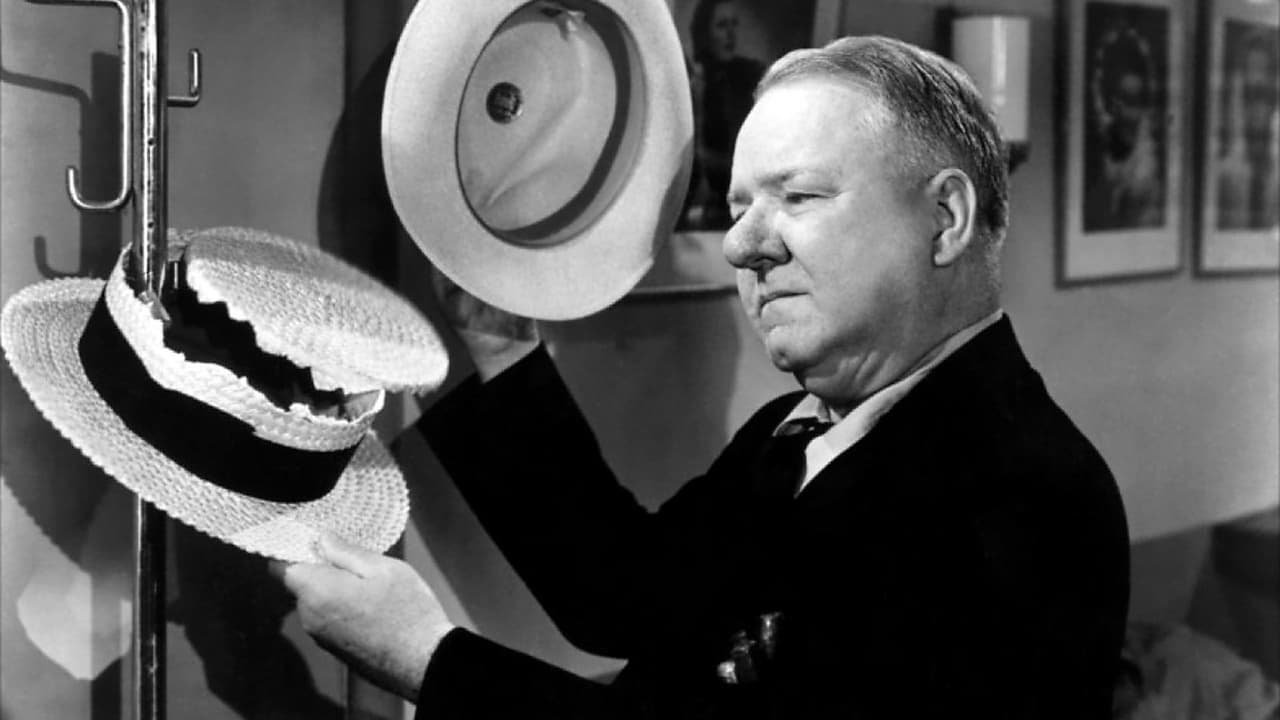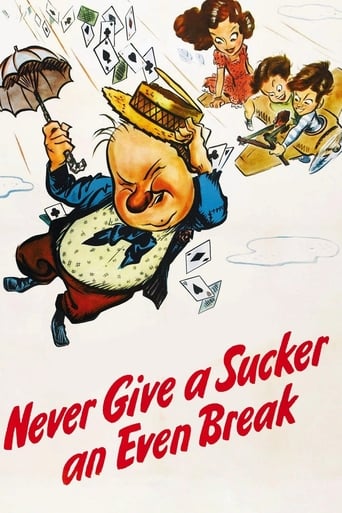



Too many fans seem to be blown away
Surprisingly incoherent and boring
If you're interested in the topic at hand, you should just watch it and judge yourself because the reviews have gone very biased by people that didn't even watch it and just hate (or love) the creator. I liked it, it was well written, narrated, and directed and it was about a topic that interests me.
View MoreGreat movie. Not sure what people expected but I found it highly entertaining.
View MoreAMC did such a thorough synopsis that I won't even attempt to explain everything here; just the highlights. There are several wildly-connected stories that seem to make no sense whatsoever, at first. It starts with W.C. getting heckled by two little boys and getting socked in the puss by a boyfriend who thought his girlfriend was being insulted. Fields is really yelling at the kids. All this, while standing in front of a huge billboard advertising "The Bank Dick". Next he trades insults with a very chunky waitress whose diner is out of practically everything (35 Cents for breakfast!). There is also an ice cream soda shop scene where he tries to eat the ice cream with two straws. "This was supposed to be in a bar... but it'll play the same anyway"! Liquor jokes abound including bottles falling out of airplanes and fermented yak milk. The main story line is explained in a strange script about Field's impossible trip to Russia to sell nuts to the natives. He finds a naive beautiful blond and her mother (Margaret DuMont) living in a beautiful mountaintop retreat after he falls out of an airplane with an open-air observation deck. He lands safely in a pile of pillows and teaches the girl how to play "Sqidgilum" (A tame form of post office). Along the way super-cute "Diana Durbin" type, Gloria Jean, sings 3 thankfully short operatic numbers. Finally, the famous 7 minute climax involves a firetruck in a hilariously-perilous trip to the maternity hospital by a non-pregnant lady. This great slapstick footage was reused in 2 other Universal Pictures: "Fireman Save My Child" and an Abbott & Costello movie. Gloria Jean is very cute. So are the Great Dane with fangs and the "fake" Gorilla! (Thankfully, the story was changed and edited so there is no mention of Gloria Jean's mom, who was to fall off a trapeze and die!).
View MoreYour response to "Never Give A Sucker An Even Break" will largely depend on your taste for W. C. Fields and / or surrealism. If you like at least one (or both) of the above, you'll probably be in heaven; if you don't, you probably won't even finish it. The film is both self-deprecating and self-serving; Fields is not afraid to make fun of himself, but it seems like he felt that, at this stage of his career, he didn't even need a script anymore: he could just show up in front of the camera, say some funny lines (his delivery is slower than usual, probably due to health problems), place himself (and others) in a series of inexplicable situations, and the audience would have no choice but to roll around on the floor laughing. This stream-of-consciousness, breaking-of-the-fourth-wall style may seem revolutionary, until you remember that the Marx Brothers had already done that sort of thing 10 years earlier (Groucho talking to the audience in "Horse Feathers", as Chico is about to start playing the piano: "I have to stay here, but there is no reason YOU folks shouldn't go out into the lobby until this thing blows over!"). Speaking of the Marx Brothers, their frequent co-star Margaret Dumont also appears here, but her role is disappointingly small; and the young Gloria Jean, who has a terrific voice but her songs have about as much to do with anything else as....anything else, co-starred with Groucho in his later vehicle "Copacabana". The film does end with a (literal) bang, though: a car chase that features some incredibly dangerous and accomplished stunt driving. **1/2 out of 4.
View MoreI watched this one first from the second of Universal's W.C. Fields Box Set because of its almost legendary status for being "completely insane", as Leonard Maltin so aptly puts it; incidentally, the film also turned out to be The Great Man's last starring vehicle (based on his own story, credited to Otis Criblecoblis). It's amazing how Fields' essentially unlikable personality has endured over the years: he's the only actor who has made a career out of constantly dwelling on his vices, i.e. the "golden nectar", and pet hates (especially children). Besides, his comic style is so personal as to be incoherent at times - but that's part of his genius: who else could come up with such a bizarre line as "How'd you like to hide the egg and gurgitate a few saucers of mocha java?" and make it sound so utterly hilarious through his unique delivery? While self-references such as abound in this film weren't uncommon in the old Hollywood, not to mention its anything-goes attitude revolving around a wisp of plot - think Universal's own HELLZAPOPPIN' (1942), for instance, with Olsen & Johnson - Fields was the only one among the great comedians who was willing to experiment in this way; in fact, some of the cast members (including the star) play themselves and, at one point, Fields is even seen admiring the poster of his latest success THE BANK DICK (1940) while two boys exclaim to one another what a bummer it was! The end result is perhaps patchy overall but often uproarious nonetheless: there are too many pauses for song - though Gloria Jean herself is pretty and charming, and the jive rendition of "Comin Thru' The Rye" by a girl who has been sheltered from the world all her life is an inspired touch. Among Fields' comic foils in the film are Franklin Pangborn (as a flustered studio head), Marx Bros. regular Margaret Dumont (playing the grande dame even in her mountaintop retreat) and Leon Errol (as Fields' rival for the hand of wealthy man-hating Dumont). Incidentally, the receptionist in Pangborn's office is played by Carlotta Monti - Fields' then-companion.The film's best scenes and gags include: the diner sequence with Fields exchanging insults with a heavy-set waitress; the disruption of Gloria's rehearsal of a musical number, over which Pangborn presides, by the set construction crew; Pangborn reading Fields' surreal script (in which, among other things, he dives off an aeroplane - whose interior and rear deck resemble those of a train's - after the gin bottle he accidentally drops, and again from a parapet when Dumont suggests that they kiss!); Dumont's fanged mastiff (an equally fake-looking gorilla also turns up here); and, of course, the classic and brilliantly-sustained chase finale (which was later lifted for the Abbott & Costello vehicle IN SOCIETY [1944]). The dialogue is equally great - including one of the star's best-remembered lines: "I was in love with a beautiful blonde once: she drove me to drink - that's the one thing I'm indebted to her for"; he even throws in a dig at the censor, when a scene that was supposed to take place in a bar had to be reset to a soda fountain! P.S. At the end, Gloria leaves with Fields and he tells her that he had promised her mother he would take care of the girl; the mother, a trapeze artist, appears at the beginning of the film but her death scene (to which this brief exchange refers) was subsequently deleted.By the way, I'm again baffled by the fact that I've yet to come across any online review for this wonderful set; also, I'm personally not bothered by the Collection's relatively high price-point - considering that we're getting, at least, 4 comedic gems (besides, by having only one film per disc, we don't risk the freezing issues which plagued Universal's Abbott & Costello Franchise releases and which have so far kept me from purchasing them).
View MoreIt was W.C. Fields' last lead role in a film - and his last knock at the system that gave him immortality. In THE BANK DICK Fields took several aims at making movies - from his drunken film director A Pismo Clam to his screenplay that was better than GONE WITH THE WIND (which he actually does sell at the end of the film). But there were many targets in THE BANK DICK. NEVER GIVE A SUCKER AN EVEN BREAK is a film about making movies. Fields is trying to sell his next picture to Esoteric Pictures, which is run by Franklin Pangborn. The crazy story line begins with him proudly seeing an advertisement billboard for THE BANK DICK, only to find two little brats razzing it. He and his niece, Gloria Jean, are both trying to get into business with Esoteric, and Pangborn is actually willing to sign up Gloria Jean - but she slaps him when he bad mouths her Uncle Bill. We see a rehearsal at Esoteric for Gloria Jean, and see the incongruities of the studio system when Pangborn, carried away by the music, finds himself also carried away by two actors dressed as Nazi soldier goose stepping. So it goes throughout the film, even ending with a mad car chase to get a woman to her destination - except she is taken to a maternity hospital that she did not want to go to. But, as THE BANK DICK showed, all comedies should end with a mad chase.There are references to other comics in the film, especially Fields' rivals the Marx Brothers. His interview with Pangborn is interrupted by Madame Pastrami, the cleaning lady - whom an angry Fields calls "a Groucho Marx" (actually she's a "Chico"). And the leading lady he tries to romance for her money in his film - Mrs. Hemoglobin - is none other than Margaret Dumont, Groucho's usual girlfriend. Field's past with Ziegfeld is brought in too (although not his film career it led to his film career). His rival for Miss Dumont is Leon Erroll, his old fellow Ziegfeld comic. One also wonders if the Marxes and Ziegfeld are the only references thrown in. The incongruous appearance of an ape on top of Mrs. Hemoglobin's mountain retreat is similar to the ape on the swinging rope bridge in the alps in Laurel & Hardy's SWISS MISS.The film lacks structure, so it is not as well received as THE BANK DICK, IT'S A GIFT, of THE OLD FASHIONED WAY. But Field's crazy script raises an issue - do we really need structure to enjoy a funny film? Years before Monty Python discovered that a sketch did not need to reach a logical conclusion to be successful, Fields demonstrated it in this full length film. He finds structure a nuisance. Look at how he openly tells the audience that his sequence in an ice cream parlor should have been in a bar. And the audience appreciates the hint.Nothing has to be straightforward, because we understand that everything means something else. Fields sings of chickens and their legs in Kansas, and we realize that the song is not about poultry, but about the legs of pretty ladies (like the stewardesses who smile while he sings). The film flows on, making a mockery of film making but celebrating it at the same time.
View More